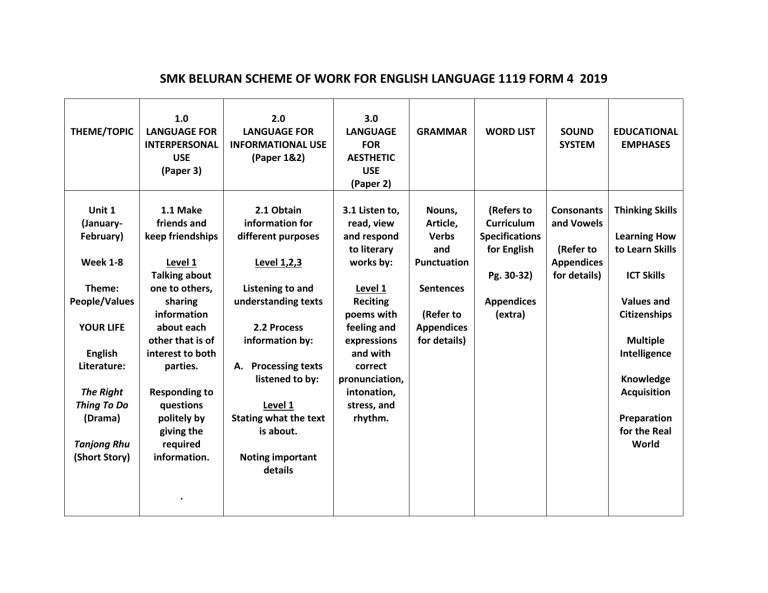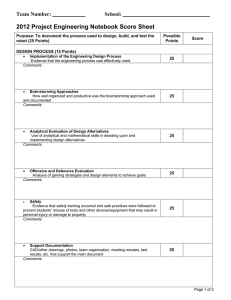
SMK BELURAN SCHEME OF WORK FOR ENGLISH LANGUAGE 1119 FORM 4 2019 1.0 LANGUAGE FOR INTERPERSONAL USE (Paper 3) 2.0 LANGUAGE FOR INFORMATIONAL USE (Paper 1&2) 3.0 LANGUAGE FOR AESTHETIC USE (Paper 2) Unit 1 (JanuaryFebruary) 1.1 Make friends and keep friendships 2.1 Obtain information for different purposes Week 1-8 Level 1 Talking about one to others, sharing information about each other that is of interest to both parties. Level 1,2,3 3.1 Listen to, read, view and respond to literary works by: THEME/TOPIC Theme: People/Values YOUR LIFE English Literature: The Right Thing To Do (Drama) Tanjong Rhu (Short Story) Responding to questions politely by giving the required information. . Listening to and understanding texts 2.2 Process information by: A. Processing texts listened to by: Level 1 Stating what the text is about. Noting important details Level 1 Reciting poems with feeling and expressions and with correct pronunciation, intonation, stress, and rhythm. GRAMMAR Nouns, Article, Verbs and Punctuation WORD LIST SOUND SYSTEM (Refers to Consonants Curriculum and Vowels Specifications for English (Refer to Appendices Pg. 30-32) for details) EDUCATIONAL EMPHASES Thinking Skills Learning How to Learn Skills ICT Skills Sentences (Refer to Appendices for details) Appendices (extra) Values and Citizenships Multiple Intelligence Knowledge Acquisition Preparation for the Real World PAPER 1 Directed Writing (Section A) Informal Letter/Formal Letter PAPER 3 1st School Based Oral Assessment (SBOA) DURATION: January March 1.2 Take part in social interaction Level 1 Disagreeing politely in simple language Offering advice in simple language. 1.3 Obtain goods and services Level 1 Making enquiries about a product in simple language. B. Processing texts read by: Level 1 Identifying simple texts. Skimming for gist and stating what the text is about. Level 2 Identifying main ideas in a simple text. Identifying supporting details in a simple text. Level 3 Predicting outcomes that are obvious in a text, giving reasons. Identifying simple cause and effect. Finding out the meaning of unfamiliar words by using contextual clues and the dictionary. Level 2 Narrating sequence of events. Describing the place and time the story took place. Level 3 Talking about the theme in a story and writing a simple paragraph on it. Level 2 Making enquiries about a product (orally and in writing) of different brand names, making comparisons, and choosing the one that gives value for the money and giving reasons. 2.3 Present information to different audiences by: A. Presenting information by: Level 1 Drawing tables, graphs, charts, diagrams, etc. Converting information into tables, graphs, diagrams, etc. Talking about the message the poet is trying to put across in his/her poem and writing a simple paragraph on it. 3.2 Express themselves creatively and imaginatively Level 1 Writing short and simple dialogues and staging it in class. Role playing characters. THEME/TOPIC UNIT 2 (March – April) 1.0 2.0 3.0 LANGUAGE FOR LANGUAGE FOR LANGUAGE INTERPERSONAL INFORMATIONAL FOR USE USE AESTHETIC USE (Paper 3) (Paper 1&2) (Paper 2) 1.1 Make friends and keep friendships Week 9-17 Theme: People/Values Level 1 Relating personal experiences. FREE TIME English Literature: Keeping a journal of daily activities. Living Photograph (Poem) 1.2 Take part in social interaction Leaving (Short Story) Level 1 Expressing concern in simple language. 2.1 Obtain information for different purposes 3.1 Listen to, read, view and respond to literary works by: Level 1,2,3 Listening to and understanding texts 2.2 Process information by: A. Processing texts listened to by: Level 1 Asking and answering questions Level 1 Retelling the story or poem in one’s own words. Level 2 Describing characters and writing simple descriptions. Making predictions as to what might happen next in the story. GRAMMAR WORD LIST SOUND SYSTEM EDUCATIONAL EMPHASES Adjectives, Pronouns, Verbs and Punctuation (Refers to Curriculum Specifications for English Diphthongs and Consonant Clusters Thinking Skills (Refer to Appendices for details) Pg. 30-32) (Refer to Appendices for details) ICT Skills Appendices (extra) Learning How to Learn Skills Values and Citizenships Multiple Intelligence Knowledge Acquisition Preparation for the Real World PAPER 1 Directed Writing (Section A) Persuading someone to do something in simple language. Level 2 Identifying main ideas and jotting down key words and phrases. Report PAPER 3 1st School Based Oral Assessment (SBOA) DURATION: January March 1.3 Obtain goods and service B. Processing texts read by: Level 2 Placing an order for a product orally and in writing. Level 1 Scanning for details. Giving feedback about a product or service as a consumer. Following sequence of ideas. Level 2 Reading and interpreting nonlinear texts such as diagrams, tables, graphs Acquiring the meaning of words by -understanding word formation through the use of prefixes and suffixes; 3.2 Express themselves creatively and imaginatively Level 1 Writing a short paragraph to recount an event in the story. Level 2 Retelling the story from another character’s point of view. Level 3 Drawing conclusions that are obvious from the facts given. -Identifying points of view in simple text. 2.3 Present information to different audiences by: A. Presenting information by: Level 2 Responding to questions and comments spontaneously (oral). -Expanding notes and outlines. Level 3 Writing brief reports, descriptions. -Applying process writing skills. THEME/TOPIC Unit 3 (May-July) 1.0 LANGUAGE FOR INTERPERSONAL USE (Paper 3) 2.0 LANGUAGE FOR INFORMATIONAL USE (Paper 1&2) 3.0 LANGUAGE FOR AESTHETIC USE (Paper 2) 1.1 Make friends and keep friendships 2.1 Obtain information for different purposes Level 1 Listening to and discriminating between consonants, vowels, diphthongs, consonant clusters, homophones, homographs, contractions. Level 1, 2 & 3 Reading silently and aloud with understanding text. 3.1 Listen to, read, view and respond to literary works by: Week 18 - 30 Theme: Values/Health MODERN TIMES English Literature: Charge of The Light Brigade (Poem) 2.2 Process information A. Processing texts listened to by: Level 3 Taking notes of the text heard. GRAMMAR WORD LIST SOUND SYSTEM EDUCATIONAL EMPHASES Verbs, Adverbs, Prepositions and Punctuation. (Refers to Curriculum Specifications for English Stress in four-syllable words Thinking Skills Pg. 30-32) Level 3 Talking about values in the text and whether they are meaningful to one’s life and writing out a simple paragraph on this. Sentences (Refer to Appendices for details) Appendices (extra) Sentence Stress and intonation Homonyms (Refer to Appendices for details) Learning How to Learn Skills ICT Skills Values and Citizenships Multiple Intelligence Knowledge Acquisition Preparation for the Real World PAPER 1 Directed Writing (Section A) Article/Speech /Talk PAPER 3 2nd School Based Oral Assessment (SBOA) DURATION: July September Level 2 Pronouncing words clearly and correctly and asking questions and making statements with the correct intonation, word stress and sentence rhythm. 1.2 Take part in social interaction Level 2 Carrying on a conversation with people one meets for the first time. Making a decision regarding an action to be taken based on agreement of all members of a group. B. Processing texts read by: Level 1 Taking note of main ideas. Using the dictionary to find the meanings of words. Level 2 Acquiring the meaning of words by -understanding contextual clues such as synonyms, antonyms and word equivalents. Identifying and writing down in full abbreviations and vice versa. Talking about how events, characters and in the texts remind one of people and events in real life. 3.2 Express themselves creatively and imaginatively Level 3 Writing the story in another genre. Composing simple poems, stories and dialogues. 1.3 Obtain goods and services Level 3 Making a complaint about services and products orally and in writing. Respond to a complaint orally and in writing. 2.3 Present information to different audiences A. Presenting information by: Level 2 Summarizing and paraphrasing the main ideas in a simple text. Level 3 Presenting reports with the aid of diagrams, graphs: -on specific topics researched and responding appropriately to questions and comments from the floor. Writing brief reports, descriptions. Applying process writing skills. THEME/TOPIC 1.0 2.0 LANGUAGE FOR LANGUAGE FOR INTERPERSONAL INFORMATIONAL USE USE (Paper 3) (Paper 1&2) UNIT 4 (AugustSeptember) 1.1 Make friends and keep friendships Week 31-39 Level 2 Reading topics of currents interest and exchange ideas. Theme: People/Values CIVIC LIFE English Literature: REVISION OF ALL LITERATURE COMPONENTS Level 3 Reading articles and giving opinions in the following ways: -agreeing with the writer -disagreeing with the writer and giving reasons. 2.1 Obtain information for different purposes Level 1, 2 & 3 Reading silently and aloud with understanding text. 2.3 Present information to different audiences 3.0 LANGUAGE FOR AESTHETIC USE (Paper 2) Application of Learning Outcomes (Jan-July) GRAMMAR WORD LIST SOUND SYSTEM EDUCATIONAL EMPHASES Connectors, Punctuation and Sentences (Refers to Curriculum Specifications for English Contractions and Words borrowed from other languages Thinking Skills (Refer to Appendices for details) Pg. 30-32) Appendices (vocabulary booster) Learning How to Learn Skills ICT Skills (Refer to Appendices for details) Values and Citizenships Multiple Intelligence Knowledge Acquisition Preparation for the Real World PAPER 3 2nd School Based Oral Assessment (SBOA) DURATION: July September 1.2 Take part in social interaction Level 3 Suggesting ways to solve a problem. Initiating and keeping a conversation going. Level 3 Presenting reports with the aid of diagrams, graphs: -from interviews (field work) and responding appropriately to questions and comments from the floor. Writing brief reports, descriptions. Applying process writing skills. FINAL EXAM PREPARATION (FORM 4) AUGUST – OCTOBER (WEEK 31 – WEEK 43)

